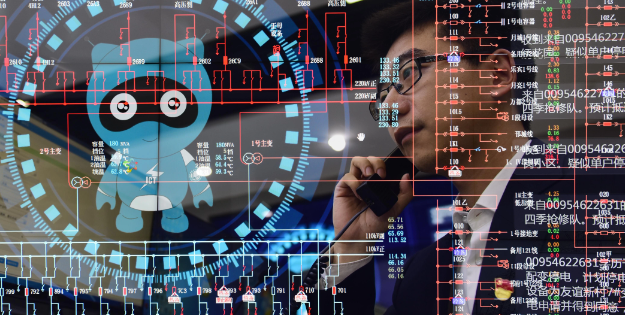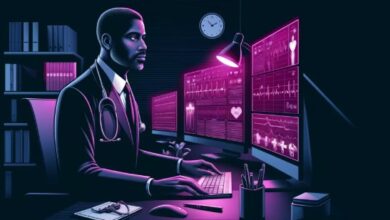
Artificial Intelligence (AI) has rapidly evolved over the years, revolutionizing various industries and significantly impacting job automation. This article aims to explore the profound effects of AI on job automation and its implications for the workforce. Read more
By diving into the evolution of AI, analyzing the rise of job automation, discussing potential benefits and challenges, examining ethical considerations, and exploring the role of humans in an AI-driven world, this article will provide a comprehensive understanding of how AI is shaping our future.
The field of artificial intelligence has undergone a remarkable transformation since its inception. From early rule-based systems to advanced machine learning algorithms, AI has become increasingly sophisticated in its ability to perform tasks traditionally done by humans.
As a result, many industries have embraced AI technology as an efficient means to automate processes and increase productivity. This shift towards automation has raised concerns about job displacement and unemployment rates among human workers who find themselves competing with machines that can perform tasks faster and more accurately.
However, it is crucial to objectively analyze both the positive and negative impacts of this technological advancement in order to devise strategies for adapting to this new reality effectively.
The Evolution of Artificial Intelligence
The evolution of artificial intelligence can be traced back to the mid-20th century when researchers began developing computer programs capable of performing tasks that required human intelligence.
Over the years, there has been significant evolutionary progress in this field, driven by technological advancements and a growing understanding of cognitive processes.
From early AI systems with limited capabilities to modern machine learning algorithms that can analyze vast amounts of data and make complex decisions, the development of artificial intelligence has been fueled by continuous research and innovation.
Technological advancements have played a crucial role in enabling AI systems to become more powerful and efficient, allowing them to tackle increasingly complex tasks previously reserved for humans.
As AI continues to evolve, it holds the potential to revolutionize various industries, from healthcare and finance to transportation and manufacturing.
However, it is important to consider the societal impact of job automation as artificial intelligence becomes more advanced.
While AI offers numerous benefits such as increased efficiency and productivity, there is also a concern about its potential displacement of human workers in certain sectors.
Balancing technological progress with ethical considerations will be essential as we navigate the future implications of AI on job automation.
The Rise of Job Automation
One significant development in the field of technology has been the increasing use of advanced algorithms and machines to perform tasks traditionally done by humans. This trend, known as job automation, has brought about significant changes in various industries and sectors.
With the advent of artificial intelligence (AI) technologies, repetitive and routine tasks can now be efficiently completed by machines, leading to job displacement for many workers. The rise of job automation has raised concerns about its economic implications. While it offers increased productivity and efficiency for businesses, it also poses challenges such as unemployment and income inequality.
As AI becomes more sophisticated, there is a growing need for society to address these issues and find ways to ensure a smooth transition for individuals affected by job displacement while harnessing the potential benefits of AI in a way that promotes overall economic growth and social welfare.
Potential Benefits of AI in the Workforce
There is no denying the potential advantages that AI brings to the workforce, as it has the capability to enhance productivity, streamline processes, and revolutionize industries.
Some of the potential benefits of AI in the workforce include:
- Improved productivity: With AI-powered automation, tasks can be performed more efficiently and accurately, leading to increased productivity. AI algorithms can analyze vast amounts of data in a fraction of the time it would take a human, allowing for faster decision-making and problem-solving.
- Streamlined processes: AI technologies can automate repetitive and mundane tasks, freeing up time for employees to focus on more complex and creative work. This not only improves efficiency but also reduces errors and enhances overall quality.
- Job creation: Contrary to popular belief that AI will lead to widespread job losses, there are opportunities for job creation with the integration of AI into various industries. As new technologies emerge, there will be a demand for skilled workers who can develop, implement, and maintain these systems. Additionally, AI can create new roles that complement human skills rather than replace them.
- Revolutionizing industries: The integration of AI has the potential to revolutionize industries by enabling innovations in areas such as healthcare, finance, transportation, and manufacturing. For example, in healthcare, AI applications can assist in diagnosing diseases more accurately or predicting patient outcomes based on data analysis. In finance, AI algorithms can detect fraudulent activities or make better investment decisions based on market trends.
These potential benefits highlight how AI has the ability to transform workplaces by improving productivity levels while creating new opportunities for employment across various sectors.
It is important to recognize that while job automation may eliminate certain roles or tasks traditionally performed by humans; it also opens up avenues for growth and innovation in ways we have yet to fully comprehend.
Potential Challenges and Disruptions
Challenges and disruptions arise when integrating AI into the workforce, requiring careful consideration of ethical implications and potential societal consequences.
One key concern is the ethical implications of job automation. As AI systems take over tasks traditionally performed by humans, there is a risk of job displacement and unemployment for individuals in various industries. This raises questions about fairness, as well as the responsibility of organizations to ensure that AI implementation does not disproportionately impact vulnerable populations.
Another challenge is the need for retraining programs to equip workers with new skills that are relevant in an AI-driven economy. Organizations must invest in comprehensive training initiatives to enable employees to adapt and thrive in this rapidly changing landscape.
Additionally, there is a potential disruption to social dynamics within workplaces as AI technologies become more prevalent. The introduction of AI systems may require adjustments in team structures and collaboration methods, potentially affecting work relationships and employee satisfaction.
Therefore, it is crucial for organizations and policymakers to address these challenges proactively by implementing robust ethical frameworks, supporting retraining programs, and fostering a smooth transition towards an AI-integrated workforce while considering the potential societal consequences along the way. Learn more
Ethical Considerations of AI and Automation
Ethical considerations surrounding the integration of AI and automation into the workforce require careful examination to ensure equitable outcomes for all stakeholders involved.
In analyzing the ethical implications, it is crucial to consider the societal impact of these technologies.
Firstly, there is a concern about job displacement and loss as AI and automation continue to advance. This raises questions about how society will accommodate those whose jobs are automated and what measures can be implemented to prevent widespread unemployment.
Additionally, there are concerns regarding bias and discrimination in AI algorithms, as they have been known to perpetuate existing societal inequalities. It is essential to address these issues by implementing strict regulations and standards that promote fairness, transparency, and accountability in the development and deployment of AI systems.
By doing so, we can strive towards a future where AI and automation contribute positively to society while minimizing harm and ensuring equal opportunities for all individuals impacted by these technologies.
The Role of Humans in an AI-Driven World
Humans play a pivotal role in navigating the complexities of an AI-driven world, adapting to technological advancements, and actively participating in decision-making processes.
In this era of increasing automation, human machine collaboration becomes essential for optimizing the benefits of artificial intelligence while addressing its potential drawbacks.
As AI takes over routine and repetitive tasks, humans have the opportunity to redefine their job roles and focus on higher-level cognitive skills such as critical thinking, creativity, problem-solving, and emotional intelligence.
By leveraging these uniquely human capabilities, individuals can contribute to innovation and strategic decision-making that are beyond the reach of machines.
Moreover, humans possess ethical judgment and values that are crucial for ensuring responsible use of AI technologies.
While automation may lead to certain job displacements or changes in employment patterns, it also opens up new avenues for skill development through lifelong learning initiatives.
Consequently, rather than being replaced by AI systems entirely, humans should embrace their coexistence with intelligent machines to create a symbiotic relationship that enhances productivity and empowers individuals in an AI-driven world.
Future Outlook and Adaptation
Adapting to the evolving landscape of technology requires a proactive approach that includes continuous learning and embracing new skills and knowledge.
As artificial intelligence continues to advance, it presents both challenges and opportunities for the future workforce. One of the main challenges lies in the transformation of job roles. Many routine tasks are being automated by AI, which can lead to job displacement for individuals performing those tasks. However, this also opens up new avenues for creativity and innovation as humans can focus on more complex problem-solving tasks that require emotional intelligence, critical thinking, and adaptability.
To thrive in an AI-driven world, individuals need to develop a growth mindset and be willing to acquire new skills throughout their careers. Lifelong learning will become essential as technological advancements continue at a rapid pace.
Additionally, collaboration between humans and machines will become increasingly important as we navigate the complexities of an AI-enabled future. By working alongside AI systems, humans can leverage their unique abilities while benefiting from the efficiency and speed that machines offer.
Overall, while there may be challenges ahead in terms of job automation, the future outlook is optimistic if individuals are willing to adapt and embrace change in order to harness the full potential of artificial intelligence. Read more
Frequently Asked Questions
How does the evolution of artificial intelligence contribute to job automation?
The evolutionary progress of artificial intelligence has had a significant impact on job automation. Through advancements in machine learning algorithms and computational power, AI systems have become increasingly capable of performing tasks that were once exclusive to humans.
This has led to the automation of various jobs across industries, ranging from manufacturing and transportation to customer service and data analysis. The economic implications of this phenomenon are profound. On one hand, job automation can lead to increased efficiency, productivity, and cost savings for businesses. On the other hand, it also raises concerns about unemployment and income inequality as certain jobs become obsolete.
Despite these concerns, it is important to acknowledge that the evolution of artificial intelligence is an inevitable process driven by technological advancements and market demands. As such, policymakers and society at large need to adapt by investing in education and training programs that equip individuals with skills that are less susceptible to automation while also ensuring a fair transition for those affected by job displacement.
Ultimately, understanding the relationship between AI’s evolutionary progress and its impact on job automation is crucial in navigating the challenges and opportunities presented by this transformative technology.
What are the potential benefits of AI in the workforce?
Potential benefits of artificial intelligence (AI) in the workforce include increased productivity and improved decision making. AI has the ability to automate repetitive tasks, allowing human workers to focus on more complex and creative endeavors. This can lead to a significant boost in productivity as AI systems can complete tasks faster and with greater accuracy than humans.
Additionally, AI algorithms have the potential to analyze large amounts of data and provide insights that can aid in decision making processes. By leveraging AI technology, organizations can make more informed decisions based on data-driven analysis, leading to better outcomes.
These benefits not only enhance efficiency but also enable individuals to allocate their time and energy towards activities that require uniquely human skills such as critical thinking, problem-solving, and innovation. In this way, AI provides a pathway to liberation from mundane work and empowers individuals to pursue fulfilling endeavors that align with their passions and interests.
What are the potential challenges and disruptions caused by job automation?
Challenges and disruptions in the workforce are inevitable consequences of job automation. As artificial intelligence continues to advance, it poses significant challenges such as the displacement of workers in certain industries, leading to unemployment and income inequality.
Additionally, there is a growing concern about the loss of human touch and personal interaction that comes with automated systems. This can have negative implications for customer service and satisfaction.
Moreover, there is a need for individuals to constantly update their skills to keep up with the changing demands of an automated workforce. These challenges require proactive measures from policymakers and organizations alike to ensure a smooth transition for workers affected by job automation while simultaneously harnessing the potential benefits offered by artificial intelligence.
By recognizing these disruptions and addressing them appropriately, society can strive towards maintaining individual freedom in an increasingly automated world.
What are the ethical considerations associated with AI and automation?
Ethical implications and societal concerns are inherent in the realm of AI and automation. As these technologies continue to advance, it is crucial to consider the potential consequences they may have on individuals and society as a whole.
One ethical consideration revolves around the displacement of human workers. The automation of jobs can lead to unemployment, income inequality, and social unrest.
Additionally, there are concerns about privacy and data security as AI systems collect vast amounts of personal information.
The use of AI in decision-making processes also raises questions about transparency, fairness, and accountability.
These ethical considerations necessitate careful regulation and oversight to ensure that AI systems are developed and deployed in a manner that aligns with societal values while minimizing harm.
How will the role of humans change in an AI-driven world?
In an AI-driven world, the role of humans is expected to undergo significant changes. With the advancement of technology and automation, certain job roles that require repetitive tasks or manual labor may be displaced by machines.
However, this does not imply that humans will become obsolete in the workforce. Rather, it necessitates a shift towards developing and utilizing human skills that are less susceptible to automation. These skills include critical thinking, problem-solving, creativity, emotional intelligence, adaptability, and complex decision-making abilities.
By focusing on honing these uniquely human attributes, individuals can remain relevant in a rapidly evolving job market. Additionally, as machines take over more routine tasks, there is an opportunity for humans to pursue higher-value work that leverages their cognitive abilities and expertise.
This transition requires individuals to continuously upskill themselves to stay ahead of technological advancements and embrace lifelong learning. Overall, while job displacement due to AI is inevitable in some sectors, it also presents an opportunity for humans to redefine their roles and contribute meaningfully in areas where their distinct skills are indispensable.
Conclusion
In conclusion, the impact of artificial intelligence on job automation has been significant and continues to shape various industries.
The evolution of AI has led to the rise of job automation, which offers both potential benefits and challenges in the workforce. While AI can enhance productivity, improve efficiency, and reduce human error, it also raises concerns about job displacement and inequality.
The potential benefits of AI in the workforce include increased accuracy and speed in tasks that were previously time-consuming or prone to errors. This can lead to enhanced productivity and cost savings for businesses. Additionally, AI technologies have the potential to handle complex data analysis and decision-making processes more efficiently than humans, leading to improved outcomes in fields such as healthcare and finance.
However, there are also potential challenges and disruptions associated with job automation. Many fear that AI may replace human workers in a wide range of occupations, leading to unemployment or reduced job opportunities. This could exacerbate existing inequalities by disproportionately impacting low-skilled workers who may struggle to adapt to new roles or acquire the necessary skills for jobs that require higher levels of technical expertise.
Furthermore, ethical considerations must be taken into account when implementing AI systems. Issues such as privacy concerns, biases in algorithmic decision-making processes, and accountability for AI-driven decisions need careful attention. It is crucial to ensure that these technologies are developed responsibly and ethically so as not to compromise user trust or violate fundamental rights.
While AI will undoubtedly play an increasingly prominent role in our lives, it is important not to underestimate the value of human input in an AI-driven world. Humans possess unique qualities such as creativity, empathy, critical thinking skills, and moral judgment that cannot be replicated by machines. Therefore, rather than replacing humans entirely with automated systems, it is more likely that a collaborative approach will emerge where humans work alongside intelligent machines.
In order for individuals and societies to adapt successfully to this evolving landscape shaped by AI technologies, it is essential for education systems to prioritize the development of skills that are complementary to AI. This includes fostering critical thinking, problem-solving abilities, and emotional intelligence. Policymakers also have a crucial role to play in ensuring a fair transition by implementing policies that promote retraining and upskilling programs for workers affected by job automation.
Looking ahead, the future outlook of AI and job automation is both promising and uncertain. While there are concerns about potential job losses and social inequalities, there is also great potential for AI to be a catalyst for positive change in various industries. By understanding the challenges and opportunities presented by AI technologies, it is possible to harness their power while minimizing adverse effects on individuals and society as a whole.
It is through careful planning, responsible implementation, and ongoing research that we can shape an AI-driven world that benefits humanity in meaningful ways.




